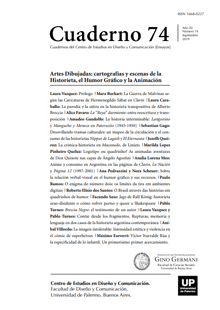O enigma do número dois: os limites da tira em ambientes digitais
Abstract
Brazilian comic strips created for digital environments have put to the test the limits of what is meant by this form of comic book production. There are cases in which the format of the story disagrees with the traditional patterns adopted by printed media. These new uses have fostered a confirmation and a questioning. The confirmation: contemporary Brazilian comic strips have presented a malleability in the format of the stories. The questioning: cases like these can be considered strips? The answer to this question is the central goal of this article, which will specifically work with Carlos Ruas’ Um Sábado Qualquer series. The author’s works will help to exemplify the theme as well will guide the exposition on the subject.
References
Baker, N. & Brentano, M. (2005). The World on Sunday: graphic art in Joseph Pulitzer´s newspaper (1898-1911), New York, Time Warner Book Group.
Blackbeard, B. & Williams, M. (1977). The Smithsonian colletction newspaper comics, Washington, Smithsonian Institution Press.
Castro, T. E. C. de (2016). Tiras cômicas online: mediação e interações na linguagem das tiras, 196 f., dissertação (Mestrado em Tecnologia), Curitiba, Universidade Tecnológica Federal do Paraná.
Fisher, B. (1919). Bringing Up Father: second series, New York, International Feature Service.
García, S. (2010). La novella gráfica. Bilbao: Astiberri.
Holtz, A. (2007). “Mutt, Jeff and Bud: the trio Who revolutionized comics”, en Fisher, Bud, The Early Years of Mut & Jeff, New York, NBM Publishing, p. 5-16.
Ramos, P. (2014). “Pontos de fuga: registros do processo de alargamento do formato das tiras”, en Nona Arte: revista brasileira de pesquisas em histórias em quadrinhos, v. 3, n. 1, p. 85-103, disponible en: .
Walker, B. (2011). Comics: the complete collection, New York, Abrams ComicArt Books.
Los autores/as que publiquen en esta revista ceden los derechos de autor y de publicación a "Cuadernos del Centro de Estudios de Diseño y Comunicación", Aceptando el registro de su trabajo bajo una licencia de atribución de Creative Commons, que permite a terceros utilizar lo publicado siempre que de el crédito pertinente a los autores y a esta revista.


